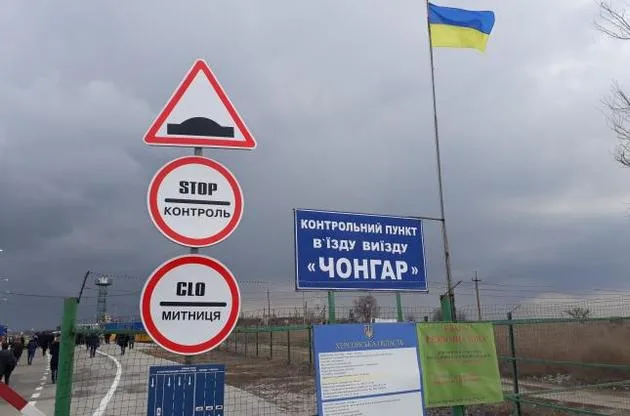Navigation and useful materials

A message on Telegram may be the basis for arrest in Russia and in the temporarily occupied territories, in particular, in Crimea. Russian special services have access even to the deleted messages of Ukrainians on Telegram. Volodymyr Liashenko, a representative of the National Council of Ukraine on Television and Radio Broadcasting, a member of the expert network of the Crimean Platform, a lawyer, told the team of the Centre for Strategic Communication and Information Security about this from his own experience of working with citizens of Ukraine from the occupied territories.
- Recently, in a Facebook post, you have mentioned that you have become aware of facts that may indicate the access of Russian special services to messages on Telegram. Tell us in general terms about the specifics of your work because you help the Crimeans who remain under occupation.
My human rights activities since 2014 have been related to the preparation of Ukrainian documents for Crimeans who were under 16 at the time of the occupation in 2014. Because of this, such citizens could not obtain, for example, passports or a birth certificate. In 2020, I received a lawyer’s certificate and continued this work as a lawyer. I would like to note that on September 4, 2023, I suspended my advocacy activities in connection with the transition to the civil service as a representative of the National Council of Ukraine on Television and Radio Broadcasting in the Autonomous Republic of Crimea and the city of Sevastopol.
During my human rights and advocacy work, I communicated with many Ukrainians in the occupied Crimea. Of course, this happened through messengers. At their request, we communicated, in particular, through the Telegram chat. Since 2021, Telegram has become the most popular messenger among my then clients.

Source: © Kherson.net.ua
When crossing the entry-exit checkpoint (at that time there were two of them: Chonhar and Kalanchak), the Russians took phones of some of our citizens to look at them. Subsequently, this became a systemic trend. As a result, people began to delete (at least I was told that they were deleting) messages that could compromise them in any way.
___________________________________________________________________________
Around the time of the pandemic, when crossing the entry-exit control point, there were situations when the Russians asked why the Crimeans had deleted some details from their chats on Telegram. That is, it can be concluded from these questions that they knew about these messages. Usually, it was about some insignificant things, but it was the first red flag. Then I clearly decided that I would not use Telegram in any way as a messenger.
___________________________________________________________________________
I also dealt with the issues of political prisoners who were detained in the occupied Crimea. In particular, in Ukraine, I represented the interests of Marlen Mustafayev, whom the Russians illegally arrested in Crimea on February 9, 2022. He was sentenced to 16.5 years. I helped Marlen’s wife, who did not have Ukrainian documents because they were stolen by the occupiers during the search. Accordingly, she could not even normally get to Ukraine and submit certain documents to recognize her husband as a political prisoner.

Then other people with similar problems began to turn to me. In the process of communication, some nuances emerged related to the danger of using Telegram as a messenger. Moreover, I have recently found out that when the Russian special services came to a Crimean with a search warrant and immediately presented him with his own messages on the Telegram chatbot as “proof.” These were messages in the allegedly pro-Ukrainian Telegram channel, which called for sharing information about the Russian military. This Crimean man was not careful.
___________________________________________________________________________
Messages became the basis for detention. I clarified on purpose: was the message presented before or after the search? The answer was unambiguous: they had already come with these messages. Of course, so far, we do not have direct evidence that Telegram “leaks” correspondence to special services. We will be able to obtain such evidence only when there is direct access to the Telegram servers.
___________________________________________________________________________
By the way, the Telegram administration is insincere when it says that its servers are located exclusively in the United States. Perhaps some servers are, but some are hosted on IP addresses on the territory of Russia. Fortunately, now there is a lot of information about this from human rights defenders and relevant civil society organizations.
Read also: Russian “Enigma” of the XXI Century: Telegram’s Connection to the Kremlin
Almost 7 years before the large-scale invasion, I worked as the head of the legal direction of a fairly powerful telecom company in Ukraine, so I understand such things in a certain way.
— Do you think that on the basis of messages on Telegram received by the special services, a person can be found guilty in Russia?
— You and I understand that the legislation in Russia is formal. That is, when the repressive machine is turned on, they do not even need evidence. They can create them if there is a need. In one of the criminal cases I know of, for example, the evidence was the conclusion of a phonoscopic examination of the convict’s voice, which allegedly confirmed the coincidence of the voice with the one on the recording of certain conversations. But for you to understand the fictitiousness of this “proof,” I should note that during the so-called investigation, a voice sample was not taken from the convict. The court rejected the lawyer’s motion to take a voice sample directly from a person because the occupation “investigators” reported that they had allegedly used the convict’s voice from an interview he gave to someone a few years ago to conduct this “examination.”
____________________________________________________________________
Therefore, messages on Telegram may well be the main evidence there (on the territory of Russia or temporarily occupied territories—ed.), or the main reason for the detention or conviction of a person.
_____________________________________________________________________
— How often have you encountered such cases when people were detained on the basis of messages, for example, in Crimea or in other territories occupied by Russia? Or with cases when people crossed the entry-exit control point with Crimea, and their messages, even deleted, were checked?
— I should note that I did not deal with this issue specifically, so I cannot be sure about everything. But I do know something. The case when the Russians came to search and really detained a person due to chats on Telegram is the only one I know of today. But before that, there were still cases when people were interrogated and released: at the checkpoint, they had “interviews” with representatives of the FSB. We are not talking about border guards, who in Russia are also part of the FSB system, but about “special forces,” the so-called unit “E” (extremism).
___________________________________________________________________________
During the quarantine period (this is almost two years from March 2020 to February 2022), I know about a dozen such cases when the Crimeans had unpleasant conversations at checkpoints with Crimea precisely because they had some messages on Telegram, which they had allegedly deleted. But the FSB knew about these messages.
___________________________________________________________________________
— Do you think that of all messengers, it is Telegram that “leaks” data to Russian special services?
— The fact the Telegram leaks information, I almost one hundred percent sure of. The Russian special services do not even hide it. More precisely, let’s say, it is not the FSB itself that does not hide, but those who cover the situation around the “fight against terrorism” in the occupation “media,” for example, the so-called “war correspondents.” They even try to present it in some way as evidence of the “power of Russia”: you see, we know everything about you, so you should give up right away. Is it, pardon me, idiotic or is it still a permitted situation when they are allowed by the FSB to publish this information? This is something that needs studying separately.

But let’s go back to other messengers. Now, a person with a Ukrainian passport, if they do not have a Russian “Ausweis,” can enter the temporarily occupied territory from abroad only through Russia, or rather exclusively through Sheremetyevo Airport in Moscow. Filtration takes place there, which can take more than a day: some people said that they were undergoing filtration for up to 30 hours. In late 2023, a citizen of Ukraine went there through Russia, having previously made sure that he had no potentially dangerous messages on Telegram. He had other messengers, which he also had “cleaned up.”
___________________________________________________________________________
So, the Russians asked this person: why don’t you have anything in other messengers as well? That is, they meant: well, we see that you have nothing on Telegram, but why the messages are cleaned up in other messengers?
___________________________________________________________________________
— What does it indicate? If the Russians have access to Telegram, then they do not have access to other messengers. This person had dangerous information on WhatsApp before deleting it. If the Russians had had the opportunity to access this information from the network or from the phone, then most likely, this person would not have entered the territory of Russia and the territory of the temporarily occupied Crimea, where he was forced to go to his parents because there was no other way.
Therefore, I still believe that other messengers do not “leak” information, in particular to the Russians, and the latter do not have such comprehensive access to other messengers as to Telegram.
— In response to an exposing article by one of the national media, the Telegram administration commented that the FSB did not have access to messenger chats. The company also assures that the data leakage is not their fault, but through spyware, obtaining a password to the account by the special services, or directly from the user’s gadget. How would you comment on that?
— Excuse me, I’ll say that Russia lies through its teeth. You can’t even refer to it at all. When I say Russia, I mean the administration of Telegram. Let’s look back on how we got Telegram. The product itself appeared in 2013, after VKontakte was actually taken away from Durov: in 2014, this company was completely bought by the Mail.Ru group. In April 2018, if I am not mistaken, Russia allegedly banned Telegram on its territory in court. Before that, from 2013 to 2018, Telegram was a loss-making project, and its share among other messengers in the territory of post-Soviet countries was negligible.
This so-called “blocking” actually was not a blocking. Now I already understand that it was, you know, such a beta test: is it possible to technically block Telegram? This test was conducted in such a way. The Russians looked at how it worked: what can be blocked and what cannot. Two years later, in June 2020, the court lifted the ban and Roskomnadzor—a public institution in Russia that deals with blocking issues—immediately started an account on Telegram and began to maintain a Telegram channel.
After that, almost immediately, Telegram received quite significant money for its development from sanctioned persons (in particular, those under sanctions in the EU and Ukraine), as well as Russian state money through VTB Bank. If they hadn’t cooperated with the institution we mentioned, would they have been given this money? No, no one would have done that. After that, Telegram’s popularity began to spike. More precisely, in Ukraine, it began to spike during the period of so-called “blocking”: in 2018-2020.

Source: Statista
It was during this period that Telegram began to be quite actively downloaded in Ukraine. You see, it had a halo of “a victim of the Russian authorities.” Like the Dozhd TV channel. If you remember, it was a kind of alternative, but it did not hesitate to show broadcast a map of Russia with the occupied Crimea as part of the federation.
After the full-scale invasion in 2022, due to the fact that Telegram provided the most operational information, its share as a source of information increased from 10% to about 40%. It overtook other sources, including the media, in particular, television, let alone printed media: unfortunately, as a source of information, they are now within the limits of statistical error: about 3-4% of the audience name them as their source of information.
_____________________________________________________________________
Telegram has effectively become the main source of information in Ukraine, so, in my opinion, it was a special operation of the FSB, when they made it a “martyr” so that we in Ukraine, pardon me, “got hooked” on it. After all, it is really convenient; you can’t deny it. But this is precisely the bait that users were caught on.
_____________________________________________________________________
— According to our data, the contracting companies that are traffic transmission networks on Telegram are exclusively of Russian origin — RETN and LLC GLOBALNET. Despite claims that it is based in the United Arab Emirates and is no longer a Russia-affiliated company. Do you know anything about this fact, can you also talk about how it can affect its operation?
— Telegram assures that the operational office is supposedly located in Dubai. Several times, the researchers tried to get into this office, that is, they came directly to the specified address, looked, tried to communicate with the operational team there. It turned out that there was really no office there. There is no one there. You do understand that this should be a rather large team because this is a powerful system that needs to be administered and improved. Telegram, unfortunately, is booming, so this team should also increase.
Therefore, all these tales that they (Telegram) are not connected with Moscow are lies. In particular, this is confirmed by their ignoring appeals from the National Council of Television and Radio Broadcasting of Ukraine.
The National Council now has the right under the new law on the media to appeal to the heads of such information platforms with the initiative of signing memorandums that allow to agree on issues, for example, the non-dissemination on the territory of Ukraine of certain information that does not comply with Ukrainian legislation or that poses a threat to the national security of Ukraine. Telegram did not make contact in any way. This is significant!
Therefore, I want to warn all Telegram users: do not use it as a messenger for chatting with anyone! Even more so, do not use it if there is even the slightest chance that you will have to enter the territory of Russia or the temporarily occupied territory of Ukraine. Keep yourself and your family safe!
If you have found a spelling error, please, notify us by selecting that text and pressing Ctrl+Enter.


